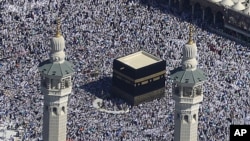More than two and a half million Muslims are continuing their pilgrimage in Mecca, the holiest site of Islam, throwing stones at a symbolic Satan as the annual ritual enters its final stages. The religious has mixed with the political this year, with the changes sweeping the Arab world on the minds of some performing the Hajj.
It is perhaps the most fraught part of the five day ceremony, the stoning of the devil, as a sea of people flows around three statues in wave after wave. The pilgrims cast pebbles symbolizing how, in the tradition of Abraham, the prophet spurned Satan who came three times to tempt him.
Saudi authorities say they have taken additional measures, including light rail service, to ensure the safety of the throngs performing the rites, one of the five pillars of the Islamic faith. The Hajj is mandatory for those healthy and wealthy enough.
And this year, there is another category of people taking part - those free enough. Among the nearly two million foreigners taking part in the pilgrimage are ordinary citizens from Libya. For decades, the chance to make the pilgrimage was dictated by Moammar Gadhafi, a system that ended with the leader himself.
The massive changes across the region were on the minds of many, even in this holy ritual. An Egyptian pilgrim said she has prayed to God to better the situation for all Muslims.
And she asked specifically for divine intervention to improve conditions in Egypt - swept by revolution earlier this year - and for the country's protection.
During the opening Hajj prayer Saturday, Saudi Arabia's Grand Mufti, Sheikh Abdul Aziz al Sheikh made reference to the unrest and change, blaming foreign elements for provoking confrontation between the people and their leaders.
But he also called on citizens to solve their problems through dialogue, not bloodshed. And in a nod to the sweeping demands for better governments, the sheikh also implored leaders to act in accordance to Islam, and not use weapons against their own people.
Arab Spring On the Minds of Hajj Pilgrims











